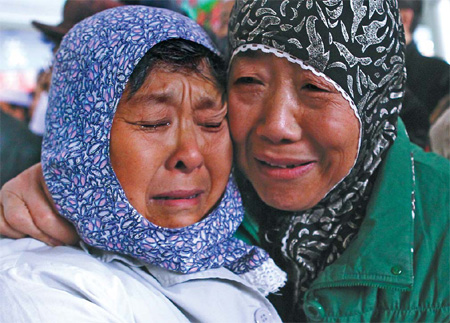Back after the Hajj, Muslims reminisce
 0 Comment(s)
0 Comment(s) Print
Print E-mail
China Daily, December 5, 2011
E-mail
China Daily, December 5, 2011
Going to Mecca for the Hajj pilgrimage is holy, but it can also involve some risk.
Ten Chinese Muslims died during the Hajj pilgrimage to Mecca this year, down from 21 last year, said a senior imam aboard the last chartered plane for pilgrims from Saudi Arabia to China on Sunday.
Two other deaths occurred on return flights after those involved had entered China. All 12 incidents involved natural causes, added Wang Chong'en, an imam from Beijing, who led a team of more than 300 pilgrims.
The last chartered plane arrived in Beijing on Sunday, carrying 324 people from provinces including Jiangxi,Heilongjiang and Jiangsu.
China arranged 41 chartered planes for about 13,700 pilgrims this year, the first plane taking off on Oct 6 from Beijing.
The total number of annual pilgrims has been less than 14,000 in recent years, and China will consider expanding the flight capacity to accommodate more applicants, with increasing experience and upgraded services for logistical, medical and safety needs, said Hong Changyou, vice-president ofChina's Islamic Association.
Wang Xiuzhen, 46, went to Mecca with her sisters, Wang Meizhen, 48, and Wang Hong, 42. The three sisters are Han Chinese from Wenzhou, East China's Zhejiang province, who were converted to Islam in 2006 in Dubai after they had run a business there for five years.
They felt lucky to be selected among the seven pilgrims from Zhejiang, and even luckier to all go together.
"The journey was physically demanding. Many Hajjs are elderly people in their 60s and 70s. Due to the hot dry climate, almost everybody fell sick, but people held on to their belief and completed the duty," Wang Xiuzhen said.
"People of different colors and nationalities gathered and prayed together. We were no different from one another and belong to one larger family," Wang Meizhen said.
Feeling purified and rid of many worries after the Hajj, the three sisters said they would bring their good spirits back to their daily lives and convert others to understanding Islam and becoming religious.
Liu Desheng, 61, from Tianjin municipality, shed some tears as he recalled the past 40 days in Mecca.
"I can never stay long enough in the holy city. The days passed so quickly. It was stunning to see millions of people going there and praying together," Liu said.
Liu also experienced rising international status and better treatment as a Chinese national. "People recognized we were from China and offered handshakes and hugs," he said, choked with deep emotion.
About 2 million people worldwide make the pilgrimage to Mecca every year.
As one of Islam's five pillars, the Hajj is required of all Muslims who are physically able to perform it at least once in their lives.
The five-day Hajj lasted from Nov 4 to 8 this year.
China is home to about 22 million Muslims, 70 percent of whom are concentrated in the western provinces, according to the 2000 census.
Muslims can apply online or through local Islamic associations for the trip. Every Hajj paid 31,000 yuan ($4,875) this year to the organizing team under China's Islamic Association, which covered transportation and hotel expenses.
Yao Yixia, 70, completed the pilgrimage in 2007. At 3 am on Sunday, she and another 50 Muslims left their community mosque in Beijing to wait for the returning Hajjs at the airport.
Yao's only son died of a sudden illness in 1998 at the age of 19, and her mother died in 2005.
Since their deaths, she has taken comfort in doing good deeds for the community and fellow Muslims. She is considering a second pilgrimage in her mother's honor.
Ma Lizhou, 39, packed his extended family in three cars and drove from Tianjin to Beijing on Saturday, to welcome his 66-year-old aunt back. Ma said the family was liberal with traditional Muslim rules, and did not wear caps or head scarves.
"The elderly are in a better position to make the pilgrimage and apply strict discipline. People of my age still have a lot of responsibilities to worry about, so my time will come some years later," he said.
Ma's 12-year-old son, Ma Ding, volunteered to join the welcome team. The sixth-grader is the only Muslim among his 47 classmates.
"I expect a great-aunt very different from the last time I saw her, a stricter and more principled Hajj," he said.







Go to Forum >>0 Comment(s)